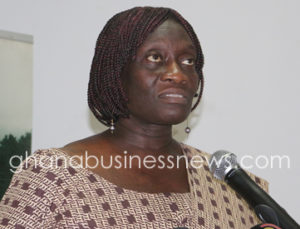Civil society organisations called upon to uphold integrity

A women’s rights activist Ms Theo Sowa has stressed that civil society organisations must be accountable while trying to hold authorities to account, and they ought to maintain the highest standards of transparency and integrity.
Ms Sowa who is the Executive Director of African Women’s Development Fund (AWDF), said issues of transparency and integrity in civil society will not be dealt with by anyone and civil society organisations need to confront them.
“We in civil society need to hold ourselves as accountable as we want to hold other people,” Ms Sowah said while addressing a conference by the International Society for Third Sector Research (ISTR) – a civil society research network – in collaboration with the West African Civil Society Institute (WACSI) and the Institute of African Studies at the University of Ghana, to assess the role of civil society.
The conference by ISTR Africa Network themed “Civil Society and a Renascent Africa: A stocktaking”, is intended as a platform to share research findings, assess and discuss the contributions, constraints of civil society in Africa within the past two decades, and the sustainability of civil society activism.
Ms Sowa said while civil society organisations have been instrumental in enhancing development and in tempering power relations in the past decades, there were “major fissures and fractures” in the sector and within individual organisations that are operating in the sector, specifically corruption and “suitcase NGOs” whose focus is money and not activism and results.
Despite the work that they do, non-governmental organizations are not free of corruption and are sometimes perceived and used by some, as a conduit for securing grants, making money and pursuing personal interests.
For instance, one study by Okoli Rowland Chukwuma, a faculty member of the University of Nigeria, of Nigerian civil society activism against a pension reform adverse to the very aged (beyond 80), found that civil society activism against the pension reform was mostly from professional organisations that were concerned with protecting and exempting only their members from Nigeria’s Pension Reform Act.
Ms Theo Sowa said corruption readily comes to people’s minds when civil society activism in Africa is mentioned, making it imperative for civil society organisations to make sure that there is “not even a hint of corruption” in their work.
“It means holding ourselves accountable. It means financial transactions must be completely clean; that they have to be very transparent.”
“So whether it’s publishing our audited accounts, whether it’s having policies against fraud, whether it’s making sure that people are disciplined or even sacked if they have anything to do with corruption, all those are things that we have to do; but I think even more importantly, we have show to the world how many of us actually are not corrupt, are doing good work, and are financially sound, with moral integrity – because this image needs to change,” the women’s rights activist said.
In an interview with ghanabusinessnews, the Executive Director of the West African Civil Society Institute Mrs Nana Afadzinu also said a culture of high transparency and accountability in civil society will make it difficult for such “suitcase NGOs” whose focus is money to thrive.
She said: “When civil society is able to regulate itself; where you have a certain culture and ethic within civil society in a country, it makes it difficult for those organisations to thrive because they don’t feel comfortable. But where everything is lax and people do what they want and we don’t know what is happening, it is difficult.”
By Emmanuel Odonkor
